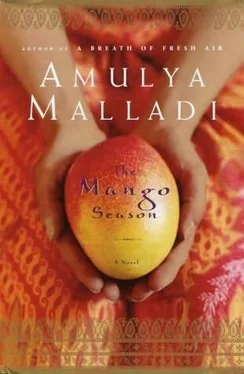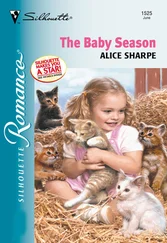I didn’t believe her.
“We will find out next week whether the baby is a boy or girl,” she added. “They can tell in the sixteenth week itself these days with that amnio test.”
“And then?”
“Then we will know.”
I didn’t care to ask her if she would have an abortion at that point; somehow, I didn’t want to know the answer.
All this for nothing, then, she had said, and her words echoed in my brain for a long time.
Lunch was served at the large dining table that filled the entire dining area next to the kitchen. Steel plates clinked on the Formica table and steel glasses tried to find a foothold. The table was in disharmony with its surroundings. The Formica clashed with the red and yellow window frame against which the table leaned; it took up too much space and didn’t really match with the cane dining chairs that Thatha had bought years before he had the table.
The Formica itself was lumpy, marred by errors of placing a hot pot directly on it or spilling water that seeped in between the thin vinyl layer and cheap wood.
The new dining table had replaced a sturdy old wooden table, which was just a few feet high and required us to sit cross-legged on straw mats to eat. But that table had to be put away in storage when Ammamma’s arthritis demanded something that would be easy on her knees. Thatha bought the table at a small furniture store in Abids that specialized in gaudy TV stands and sold other assorted items of the same low quality as the dining table.
Thatha had liked the size of the table and the shining top had appealed to him as well. It had taken only six months for the shining top to become dull and lumpy, but by then the small furniture store had closed down and Thatha got stuck with the table, lumps and all.
A mound of hot rice settled in the center of the table and around it dark bobbing heads joined steel utensils filled with avial, bottle gourd pappu, potato curry, and cold yogurt.
Two jugs of ice-cold water were emptied in little time and the ceiling fan rattled endlessly, providing little surcease from the interminable heat. But I was getting used to it.
“Have you been to Noo Yark?” my grandmother asked as she attacked her food, her mouth open as she chewed.
“Yes,” I said, and dropped my eyes to my plate where my fingers danced with the rice and the creamy bottle gourd pappu. How easy it was to eat with my fingers again. I had forgotten the joys of mixing rice and pappu with my fingers. Food just tasted better when eaten with such intimacy.
“Very good avial, Priya-Amma,” Thatha remarked, and I nodded, pleased with the compliment.
“Noo Yark is a dangerous place, it is,” Ammamma said, smacking her lips together and mixing the rice with avial on her plate with her fingers.
“The white people are just… crooks,” she continued, and my head shot up. “And the black people… those kallu people are all criminals.”
My eyes widened with shock.
“And how do you know this?” I asked, unable to completely submerge my instinct to get on my antiracism soapbox. Nick would love to be in on this conversation, I thought.
“I see Star TV,” Ammamma said proudly. “All black people are doing drugs and they kill on the street. Vishnu… you remember him?”
I didn’t, but I nodded.
“His son was mugged by a kallu person in Noo Yark. A black man”-she dropped some food into her mouth-“put a gun to his head.” She spoke with her mouth full and I grimaced at her words and the half-chewed visible food. “All black people… dirty they are.”
And what had my grandmother done-smelled their clothes? Frustration warred with the reality of the situation in front of me, and reality won.
“That is right,” Thatha spoke up, and exhibited his ignorance. “All white people do is exploit the others. And the black people kill. That country is just… no family values, nothing. All the time they get divorced.”
“They have a moral structure, Thatha.” I could hardly sit silent in front of such blatant disregard for the facts.
“What moral structure?” Ma glowered. “Your friends… what, Manju and Nilesh, they were fine when they were here and they would have been fine if they had not gone to America.”
Manju and Nilesh were classmates from engineering college in India. They started their romance in the first year of college and survived as a couple through four years of engineering college, two years of graduate school in the United States, and a year or so of working in Silicon Valley before getting married. But happily ever after had evaded them. They had recently divorced and I made the big mistake of telling Ma about it. She immediately decided that it was because of the evil American influence.
“These friends of hers got married,” Ma explained to the others. “Same caste, same… real good match. They went to America and now they are getting a divorce after four years of marriage. What happened? If they were in India, it would have never happened.”
She was absolutely right. They definitely would not have gotten a divorce in India. After all, divorce was still not commonplace. The pressure from their families would have kept them together even as Nilesh screwed everything in a skirt including Manju’s older married cousin.
“Why did they get a divorce?” Neelima asked softly.
“Does it matter?” my mother launched into a tirade. “They got a divorce and they would have been married if they were here in India. There… no one cares. Women have three, four marriages and all the men cheat on their wives. They all sleep around.”
This was why I knew it was going to be a tough, tough thing to tell the family about Nick. They had condemned the entire Western world to being immoral criminals and crooks. What chance did poor Nick stand in getting a fair trial?
“They don’t all sleep around,” I defended. “In the South, couples don’t have sex until they get married. They’re very religious there.”
I don’t know how and why this discussion was taking place. I couldn’t remember discussing sex in any fashion with my family ever before. Sowmya and I would talk about it once in a while, but that was girl talk. This was simply too weird.
“And then there are those religious fanatics,” Thatha added, and I lost it.
“And here there are none?” I demanded. “How can you say that about the West when you know nothing about it?
“Damn it, this country has its own screw-ups. Men beat up their wives and the wives stick to their marriages. At least in America they have a way out. They can walk out of their sick marriages. Here people don’t decide who they should marry, spend the rest of their lives with-their parents do. That seems okay to you?”
Silence fell like rain in monsoon. Thatha looked at me with the look reserved for the belligerent or the retarded-I wasn’t sure which.
“You only live in the States. It is not your country. They will never accept you. You will always be an outsider there, a dark person. Here they will accept you and don’t use foul language in this house,” Thatha said.
“Accept me?” I was on a roll so I stepped into cow dung, big time. “I apologize for the foul language, but, Thatha, you don’t accept Neelima because she comes from another state. You don’t accept Indians and you expect me to believe I’m accepted in this society. How long will this society accept me if I want to live by my own rules?”
“All societies have rules,” Lata launched into the discussion. “You have to follow American society rules, don’t you?”
I smiled that sick sarcastic smile I was warned against by Ma all my life. “Yes, but in that society no one can pressure me into having a child so that a family can have a male heir and-”
Читать дальше











